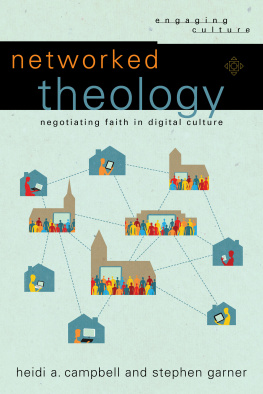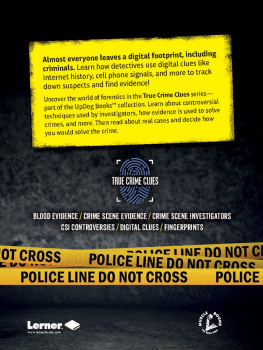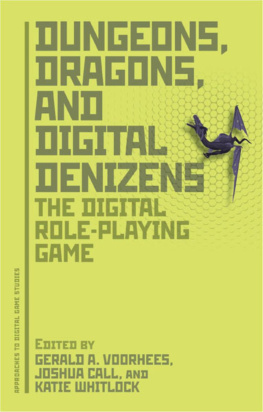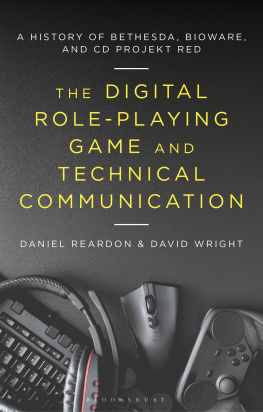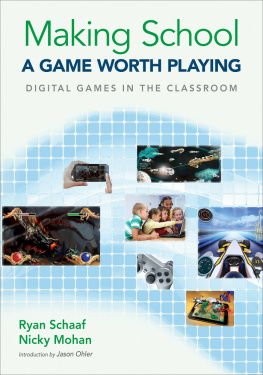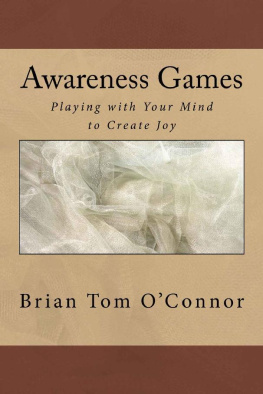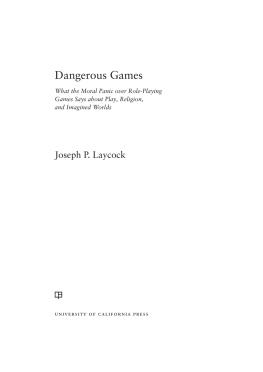Campbell Heidi A. - Playing with Religion in Digital Games
Here you can read online Campbell Heidi A. - Playing with Religion in Digital Games full text of the book (entire story) in english for free. Download pdf and epub, get meaning, cover and reviews about this ebook. year: 2014, publisher: Indiana University Press, genre: Religion. Description of the work, (preface) as well as reviews are available. Best literature library LitArk.com created for fans of good reading and offers a wide selection of genres:
Romance novel
Science fiction
Adventure
Detective
Science
History
Home and family
Prose
Art
Politics
Computer
Non-fiction
Religion
Business
Children
Humor
Choose a favorite category and find really read worthwhile books. Enjoy immersion in the world of imagination, feel the emotions of the characters or learn something new for yourself, make an fascinating discovery.

- Book:Playing with Religion in Digital Games
- Author:
- Publisher:Indiana University Press
- Genre:
- Year:2014
- Rating:3 / 5
- Favourites:Add to favourites
- Your mark:
- 60
- 1
- 2
- 3
- 4
- 5
Playing with Religion in Digital Games: summary, description and annotation
We offer to read an annotation, description, summary or preface (depends on what the author of the book "Playing with Religion in Digital Games" wrote himself). If you haven't found the necessary information about the book — write in the comments, we will try to find it.
Playing with Religion in Digital Games — read online for free the complete book (whole text) full work
Below is the text of the book, divided by pages. System saving the place of the last page read, allows you to conveniently read the book "Playing with Religion in Digital Games" online for free, without having to search again every time where you left off. Put a bookmark, and you can go to the page where you finished reading at any time.
Font size:
Interval:
Bookmark:
Playing with Religion
in Digital Games
DIGITAL GAME STUDIES
Robert Alan Brookey and David J. Gunkel, editors
RELIGION in
DIGITAL GAMES
Edited by
HEIDI A. CAMPBELL
and
GREGORY PRICE GRIEVE

This book is a publication of
INDIANA UNIVERSITY PRESS
Office of Scholarly Publishing
Herman B Wells Library 350
1320 East 10th Street
Bloomington, Indiana 47405 USA
Telephone orders 800-842-6796
Fax orders 812-855-7931
2014 by Indiana University Press
All rights reserved
No part of this book may be reproduced or utilized in any form or by any means, electronic or mechanical, including photocopying and recording, or by any information storage and retrieval system, without permission in writing from the publisher. The Association of American University Presses Resolution on Permissions constitutes the only exception to this prohibition.
 The paper used in this publication meets the minimum requirements of the American National Standard for Information SciencesPermanence of Paper for Printed Library Materials, ANSI Z39.481992.
The paper used in this publication meets the minimum requirements of the American National Standard for Information SciencesPermanence of Paper for Printed Library Materials, ANSI Z39.481992.
Manufactured in the
United States of America
Cataloging information is available from the Library of Congress
ISBN 978-0-253-01244-9 (cloth)
ISBN 978-0-253-01253-1 (paperback)
ISBN 978-0-253-01263-0 (ebook)
1 2 3 4 5 19 18 17 16 15 14
To our next generation of gamers: Grey, Faith Ann, Hopeful, and Ian
WE WISH TO THANK THE DIGITAL GAME STUDIES SERIES editors, Robert Alan Brookey and David J. Gunkel, for their support of this project, and we are grateful for the wonderful editorial support and oversight offered by Raina Polivka at Indiana University Press. Heidi A. Campbell wishes to thank the fellow scholars working in the overlapping areas of media, religion, and game studies, especially Mia Lvheim, Patrick Burkhart, and Srividya Ramasubramanian for their support and encouragement related to this project. Gregory Price Grieve would like to thank Anne Blankenship, Vincent Gonzalez, Rabia Gregory, Shanny Luft, Brian Moynihan, and Pamlea Mullins Reaves. It was their innovative panel, which Grieve presided over at the American Academy of Religion Conference in 2007, that opened up the field. He would also like to thank Christopher Helland because what happens in the magic circle stays in the magic circle.
Playing with Religion
in Digital Games
Offers Digital Game Studies
Heidi A. Campbell and Gregory Price Grieve
THE PERPENDICULAR GOTHIC SPIRES OF A THIRTEENTH-CENTURY medieval cathedral tower over the strangely empty English countryside. Inside, the richly decorated choir stalls are empty; the sun filters through the stained-glass windows, streaking the dust-filled air and illuminating the gilded nave and the hallowed halls, which are covered with a veneer of centuries of prayer. Suddenly, there is a blood-curdling screech, and the cathedral is filled with the scurry of hundreds of spider-like creatures that fill the shadows. A blast shatters the silence, and multiple flashes of gunfire light the darkness. An archway begins to crumble; tracer bullets fill the air, leaving behind red puffs of blood. For a moment there is near-silence, with only strange growling whispers to be heard. Then, the click of reloading, and the shooting begins again.
Of course, this is not happening in the actual world, but in a digital game. The violent shootout is under way between the alien race called the Chimaera and the last vestiges of humankind in Sonys first-person shooter game Resistance: Fall of Man (Insomniac Games, 2006). Set in an alternative history where Europe has been invaded by aliens, a virtual copy of Manchester Cathedral in England is utterly destroyed at the hands of warring soldiers and, of course, the gamer.
Soon after the release of the game in the United Kingdom, the Church of England claimed that the digital depiction desecrated the actual physical cathedral and violated copyright.increasingly intertwined with new forms of media. In the twenty-first century, scholars have noted how people use digital media to recreate religious practices: they visit online shrines, take virtual pilgrimages, and incorporate social media and the internet into their spiritual routines. Despite this, the study of religion and gaming has not received much attention in the study of religion and the internet and remains one of the most understudied elements of such digital environments.
In this book, digital gaming is explored as a field filled with potential for new insights into the place, presentation, and impact of religion within popular culture. As the contributors elucidate, digital games are not a superficial phenomenon peculiar to an uncharacteristic cultural activity. Rather, digital games are an important site of exploration into the intersection of religion and contemporary culture that helps us understand what religion is, does, and means in a changing contemporary society. In fact, Playing with Religion contends that just like films helped to illuminate and expose the religiosity of the twentieth century, digital games now depict the religious within the twenty-first century. This volume also offers a space for discussion of the nature of play within our notions of religious participation and spiritual searching.
Careful study of the symbolism found in popular games such as Resistance: Fall of Man reveals that digital games often rely on important cultural and religious content to drive both the narrative and gameplay, utilizing these modes as unique forms of cultural communication and valence. Further, and as the chapters in this volume demonstrate, references to religious and cultural practices in digital games inform the role religion plays in the organization of contemporary society. As Walter Ong argues in The Presence of the Word: Some Prolegomena for Cultural and Religious History, different media may make different religiosities possible. Ong suggests that religion began in an era of orality, was transmitted into visual form through manuscript writing as well as print, and has now entered the world in a new way via electronic media. This volume contends that digital games both reflect and shape contemporary religiosity, creating a fertile ground for research into what it means to be human in the fullest sense.
We suggest that studying the intersections between digital games and religion has often been neglected for four reasons: games are widely considered simply a form of young peoples entertainment; video games are often seen as artificial or unvalued forms of expression; technology is thought to be secular; and virtual gaming worlds are seen as unreal. Because games are assumed to be merely frivolous childish fun, mixing religion and gaming is problematic for many people. Nonetheless, as Jason Anthony indicates in this volume, religion and games have a long intertwined history. Echoing the work of the Dutch historian and one of the founders of game studies Johan Huizinga, Rachel Wagner shows that games and religion share many of the same structural elements.
While some still perceive the average digital game player as a young male playing alone, just wasting time, a large gap exists between the public perception of who plays video games and what the research demonstrates.
Next pageFont size:
Interval:
Bookmark:
Similar books «Playing with Religion in Digital Games»
Look at similar books to Playing with Religion in Digital Games. We have selected literature similar in name and meaning in the hope of providing readers with more options to find new, interesting, not yet read works.
Discussion, reviews of the book Playing with Religion in Digital Games and just readers' own opinions. Leave your comments, write what you think about the work, its meaning or the main characters. Specify what exactly you liked and what you didn't like, and why you think so.



